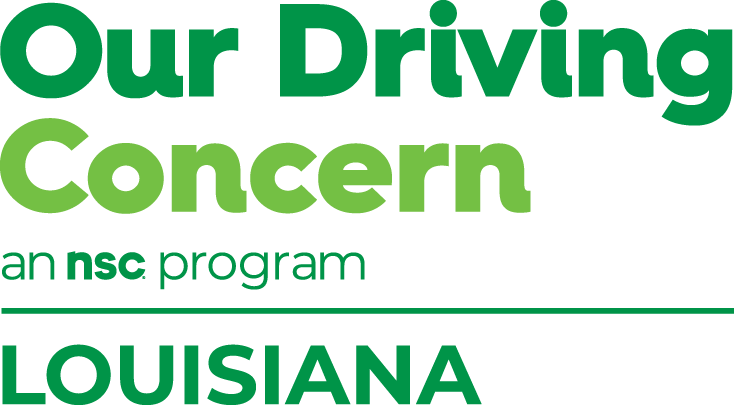Float This Safety Idea
 During Mardi Gras season, we’ve all come to expect music and art, parades and floats, costumed revelers and a carnival-like atmosphere. It’s a time to eat rich foods and go all out before the Lenten fasting period begins.
During Mardi Gras season, we’ve all come to expect music and art, parades and floats, costumed revelers and a carnival-like atmosphere. It’s a time to eat rich foods and go all out before the Lenten fasting period begins.
Everyone is eager to indulge and have a good time. Let’s work to ensure everyone is safe, too. Too often we read and hear about stories of a good time gone bad, like a recent report involving a Louisiana state trooper who was involved in a crash while stopped at a red light.
An impaired driver rear-ended the trooper during a rare January snow event, according to police reports. Fortunately, the trooper was not hurt; the driver was arrested for driving under the influence. We’re all aware of the deadly results of impaired driving in normal conditions, but impaired driving in inclement weather adds another layer of risk entirely.
Why should you take note? The workplace is a natural setting for distributing traffic safety messages and discussing driver behaviors. By developing company policies, providing education and offering incentives, employers can save lives and save money.
Impairment starts with the first drink, but it’s not just alcohol that causes impairment. Causes include all things that diminish an individual’s ability to function normally, both physically and mentally.
Here are three timely safety reminders you can share with coworkers, friends and loved ones during this season of Mardi Gras celebrations:
- Keep calm as you drive to avoid stress. If you’re frustrated by traffic congestion, remember your mother’s advice: Count to 10. Share: 7 Tips to Avoid Stress.
- Understand the warning signs of being too tired to drive safely. Play this one-minute video from the National Safety Council during your next team meeting. Then, open the floor for discussion and ask others if they’ve witnessed drivers nodding off or they’ve felt exhausted themselves behind the wheel.
- How much is too much? Your gender, body weight, the number of drinks you’ve consumed and the amount of food you’ve eaten affect your body’s ability to handle alcohol. Share free resources from the National Highway Traffic Safety Administration and be sure everyone on your team understands how alcohol affects driving ability.
Let’s have fun. Let’s also prioritize safety!
Cannabis Legalization Trends
 What You Need to Know
What You Need to Know
Recreational cannabis use is now legal in 24 states, three U.S. territories and the District of Columbia. Additionally, seven states, including Louisiana, have decriminalized cannabis use. However, Louisiana recently tightened regulations on the hemp industry, implementing measures such as:
- Setting serving size limits on THC products like gummies and seltzers
- Banning the sale of flower hemp products
- Prohibiting the sale of hemp-THC products to anyone under 21
- Prohibiting hemp product sales at gas stations
Addressing Common Misconceptions
As cannabis legalization expands, so do unsubstantiated rumors. One pervasive myth is that legalization equates to safety. This misconception has implications, particularly in workplaces where safety is a priority. National Drugs and Alcohol Facts Week (March 17-23) is the perfect time to set the record straight.
The Impact on Workplace Safety
Increased availability of high-potency cannabis products amplifies the potential for impairment, even in states where cannabis remains illegal. Unlike alcohol, the effects of cannabis are not yet fully understood. However, research shows that cannabis use:
- Decreases motor skills
- Slows reaction times
- Impairs judgment
These factors are critical when operating equipment or vehicles.
Cannabis Detection vs. Impairment
One unique challenge with cannabis is its detectability in the body. While alcohol is metabolized predictably and correlates directly to impairment, cannabis is stored in fat cells and can be detected for up to 30 days after use. Impairment depends on various factors, including frequency of use, method of intake and product potency. This disconnect between detection and impairment creates challenges for both employees and employers.
- For employees: Cannabis use days or weeks prior could result in failed drug tests, even if the employee is not impaired
- For employers: Removing THC from drug panels may increase workplace incidents and drug positivity rates post-incident
Safety First: Education and Awareness
Keeping workplaces safe is the ultimate goal. The National Highway Traffic Safety Administration emphasizes, “If you feel different, you drive different.” Studies show that 56% of drivers involved in serious injury or fatal crashes test positive for at least one drug. These statistics highlight the importance of education and awareness.
Final Thought
Boost your continuing education efforts to ensure everyone understands the risks of cannabis impairment. The key to change is knowledge.
